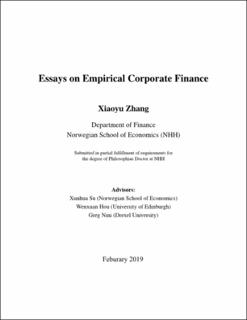| dc.description.abstract | This dissertation consists of three independent papers about the effect of going public on loan
contracting and how institutional investors affect investments in corporate social responsibility.
The first paper studies how going public affects bank monitoring. We propose several channels
through which going public may have impact over the design of loan contracts, in particular, the
use of performance-contingent terms such as performance pricing and loan covenants, which are
the key means of bank monitoring. Using a large sample of DealScan loans made within 3 years
before initial public offering (IPO) and 3 years after IPO, we show that loans after IPO have significantly higher bank monitoring. For example, loans after IPO have an 144% higher probability
to include interest-increasing performance pricing, and a 12% higher probability to include financial covenants, after controlling for borrower, loan and IPO characteristics, as well as industry and
year fixed effects. The significance maintains both statistically and economically for a large set
of robustness checks and identification strategies. The findings are consistent with the argument
that: First, after going public, strict regulation and more analyst coverage, both of which improve
the quality of disclosure, lead to lower monitoring costs and higher supply of monitoring; second,
dispersed ownership after going public aggravates the free-rider problem, which impedes shareholders’ monitoring over firm decisions and thus increases the demand of bank monitoring. The
results suggest that there is a shift of monitoring from concentrated shareholders before IPO to
concentrated lenders after IPO.
The second paper tries to answer one question: Why issuers do not get upset by IPO underpricing? We in particular provide evidence from the loan market. The majority of IPOs have been
underpriced in the past decades. Despite leaving substantial amount of money on the table, issuers
rarely get upset and high-underpricing underwriters constantly gain market share. It is puzzling
that issuers seem not to be upset about IPO underpricing. For an explanation, extant literature
focuses on studying three main players in the IPO market: the IPO firm (entrepreneurs and managers), the underwriter(s), and stock investors. This paper instead looks out of the IPO market and,
as the first, link underpricing with the benefit of going public from the loan market. We show that
IPO underpricing is associated with significantly lower borrowing costs of the issuer after going
public. The average reduction in the loan interest spread for firms with above-median IPO under5
pricing is about 23.7% of their pre-IPO loan spreads, which almost doubles the 12.6% reduction
for firms with below-median underpricing, after controlling for firm and loan characteristics, and
important factors that affect IPO underpricing. This larger reduction in borrowing costs amounts
to about U.S. $0.79 billion per year for our sample firms, which is substantial relative to the total
amount of money left on the table due to higher underpricing (U.S. $21.06 billion).
The third paper develops a risk-management view of CSR by arguing that CSR provides
insurance-like effects in adverse corporate events. Since passive investors have diversified away
most idiosyncratic risks, we predict that they demand less CSR as a strategic approach to manage risks. Employing unique setting of the annual reconstitution of the Russell 1000 and 2000
indexes that bring exogenous shocks to passive investor ownership, we find that firms with higher
passive fund ownership exhibit significantly lower CSR engagement. Specifically, we show that
on average a one percent increase in passive ownership leads to a 0.3 point decrease in CSR score
(i.e., 0.16 standard deviation). The results are robust to alternative bandwidth and polynomial order, additional control variables and various subsamples. The effects are more pronounced among
better-diversified passive investors and firms that are not in CSR-sensitive industries. We also find
that passive investors hold back CSR activities through the channel of “voice” by reducing the
number of socially responsible investment (SRI) proposals. Overall, the findings shed light on
the risk-management function of CSR and provide original evidence that passive investors imprint
their preference on firm policy | en_US |
